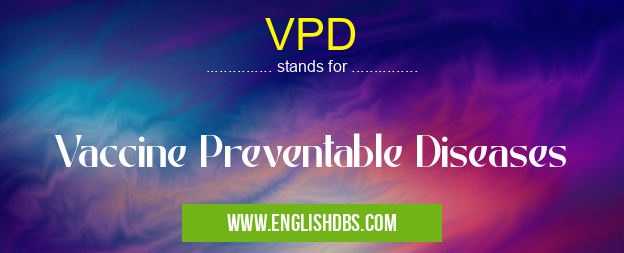What does VPD mean in MEDICAL
Vaccine Preventable Diseases (VPDs) are illnesses that can be prevented through immunization. Vaccines work by introducing a killed or weakened form of the disease-causing organisms, known as antigens, into the body so it can build up immunity.

VPD meaning in Medical in Medical
VPD mostly used in an acronym Medical in Category Medical that means Vaccine Preventable Diseases
Shorthand: VPD,
Full Form: Vaccine Preventable Diseases
For more information of "Vaccine Preventable Diseases", see the section below.
Essential Questions and Answers on Vaccine Preventable Diseases in "MEDICAL»MEDICAL"
What are some common VPDs?
Common VPDs include measles, mumps, rubella, diphtheria, tetanus, pertussis (whooping cough), poliomyelitis (polio), influenza (flu), and human papillomavirus (HPV).
How effective are vaccines in preventing VPDs?
Vaccines have drastically reduced the occurrence of many diseases. For example, before the introduction of the measles vaccine in 1963, approximately 3 to 4 million Americans were estimated to contract measles each year. Following widespread use of this vaccine, there were fewer than 1,000 cases reported in 1997.
Are there any risks associated with being vaccinated for VPDs?
The current vaccines available for use in the United States have been proven safe over decades of research and use. However, like any medication or procedure, vaccinations may cause side effects and other adverse reactions; though these are typically minor and do not last long. For example, a mild fever may occur after receiving certain vaccines such as measles-mumps-rubella (MMR).
Final Words:
Vaccines have had a profound effect on improving global health and have greatly reduced the incidence of many VPDs. Additionally, they are generally considered safe and effective methods for preventing these diseases. As such, immunizations remain a cornerstone of public health policy worldwide.
